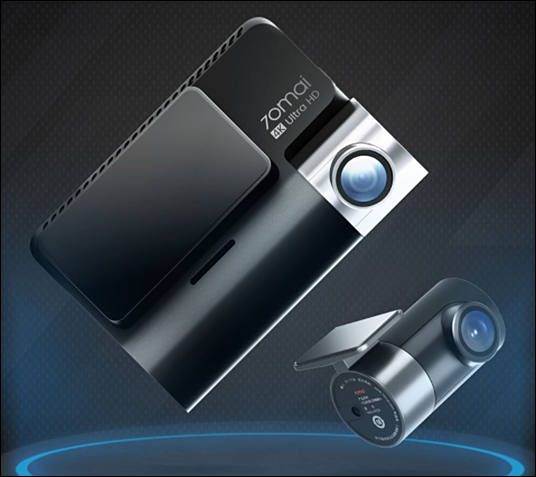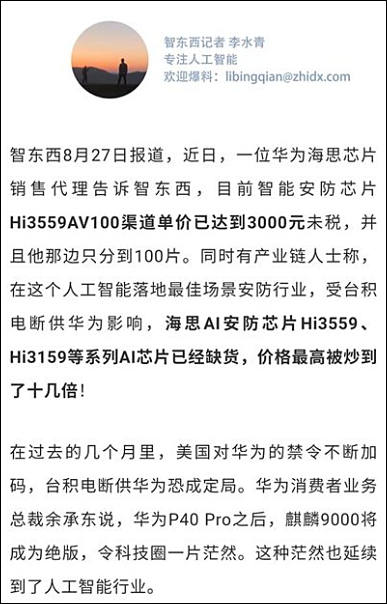
-
Got new interesting email. Guy who also buys such chips told that situation is much worse and you literally can't get them (at least he can't). Lot of Alibaba listings and alike offers are just resellers doing listings using automated software and not having stock.
Facebook message in Chinese told that it is big panic in Z-CAM. For now they don't have any plan how to fix it. All of their cameras use this chips and most engineers/developers are good in using this HiSilicon LSI and corresponding SDK/libraries. Moving to any other solution (it is no 8K cheap solution on the market now) will mean delay in 1-2 years and company won't make it such far.
-
Prices of Huawei handsets at Shenzhen wholesale market Huaqiangbei have gone up 100 yuan to 300 yuan as dealers expect the firm’s access to chips to run dry.
Huawei CEO Guo Ping says that US sanctions affecting the firm’s high-end Kirin chips will ‘cause certain difficulties’ but he is optimistic about resolving them.
The Post spoke to four third-party dealers in Huaqiangbei, all of whom said the prices of Huawei models are rising day-by-day. “The reason is simple – Huawei cannot get chips for their smartphones. The supply is limited,” said one vendor, Lu Jinwei.
At a recent event for new employees, Huawei CEO Guo Ping painted a relatively optimistic picture of the company’s future. “The company is in normal condition,” Guo said, according to a transcript released on Xinsheng Shequ, Huawei’s official employee community platform, on Wednesday. “The issue is just how, when faced with restrictions to advanced components, we can overcome this obstacle and establish our own lasting technological capabilities as well as a stable and credible supply chain.”
“The restrictions on Kirin chips will cause certain difficulties, especially for our high-end smartphones, but I believe we can resolve them,” he added. To survive, Guo said that the company will continue investing in its chip design arm HiSilicon, while also helping front-end partners such as those supporting its IT services to build their capabilities.
“The US cannot defeat Huawei, only Huawei can defeat itself … if these problems are not handled well, we will fail and die.”
If Z-CAM CEO won't handle problems well - company will fail and die.
Btw I got private email from ex Z-CAM worker who kept contacts inside company and it fully agree with my initial post, situation is dire but top management talk with unfounded optimistic fairy tales manner.
-
I think china will takeover Taiwan if pushed. The joint china-taiwan tech sector can survive independently.
-
Interesting is that Xiaomi Youpin also collects money for device they have issue delivering

Using Huawei HiSilicon H13559.
Also developers I talked told that it is true that HiSilicon chips documentation sis mostly lacking and horrible quality. Libraries are being written by very low level developers and are full of bugs, due to fear of other Chinese companies copy almost all of them are closed.

 sa14356.jpg536 x 477 - 30K
sa14356.jpg536 x 477 - 30K -
For now we don't even know if China will make it as single country through this long and hard trade war.
One of huge US advantages is thinking very long term and Chinese middle and top level management flaw is extreme pursuit of profits now.
-
One of the things constantly mentioned is the audio gaps made during file splitting.
Recent rumor is that E2 team just do not have code for this parts, so they use compiled library provided by HiSilicon (with usual almost full lack of documentation) and this is why they can't fix simplest issue.
Same is true for very strange thing with all E2 cameras being picky to various, even good SSDs.
Z-CAM team just don't work on the necessary level to make proper buffering also also use same compiled libraries and can't fix the issue.
-
@Vitaliy_Kiselev How many years would it take to China to build his own chip industry without relying on Us patents ?
-
Due to the U.S. government has tightened its sanctions against the Chinese manufacturer Huawei, more and more employees of the chip division HiSilicon are leaving the “sinking ship“.
Both middle and senior HiSilicon employees are about to leave the company.
-
I see all posts now must be approved before being posted. Seems like big change in direction.
Weather changed for Z-CAM and Chinese manufacturers overall, talking to many they still do not get that some of them will be thrown out as soon as January or even sooner, and most probably it will be united EU/Australia/NZ/UK/Brazil decisions.
-
I see all posts now must be approved before being posted. Seems like big change in direction.
-
Instantly deleted and banned all info in official group, in private he keeps silence. Things must be really really bad, as otherwise it had been 2 minutes to explain.
-
What does CEO say?
-
 HiSilicon Hi3559A V100 price
HiSilicon Hi3559A V100 priceAt this special time for hisilicon, the price for 3559A is 435 bucks each, it used to be 100 to 120 bucks back in the days when supply was stable.
From Adam Werton post.

 sa14233.jpg387 x 604 - 48K
sa14233.jpg387 x 604 - 48K -
Bloomberg part on issue
Washington first barred Huawei from buying America technology, including chips, in 2019. It didn’t take long for suppliers to find a loophole though. A rule exempting goods that are 75% produced outside the U.S. allowed companies such as Micron Technology to continue selling to Huawei.
U.S. authorities, over the protest of American suppliers, ultimately closed that loophole in May of this year by expanding its ban to include chips made using American equipment. With gear from U.S. companies such as Applied Materials and Lam Research ubiquitous across the semiconductor industry, it significantly ratcheted up the pressure on Huawei.
But again, there appeared to be a loophole. Washington’s restrictions seemed to leave room for Huawei to buy chips made by non-American companies such as Mediatek. Indeed, shares of the Taiwanese chipmaker surged on speculation that a wave of Huawei orders were on the horizon. Until this week, that is.
Recently the U.S. expanded its restrictions to include chipmakers based anywhere in the world that use American software or equipment to produce semiconductors (all 100% of them except few domestic military ones that use very old processing norms).
Jefferies analysts including Edison Lee wrote in a note to clients that closing this loophole “puts Huawei’s survival at risk.”
Howdy, Stranger!
It looks like you're new here. If you want to get involved, click one of these buttons!
Categories
- Topics List23,990
- Blog5,725
- General and News1,353
- Hacks and Patches1,153
- ↳ Top Settings33
- ↳ Beginners256
- ↳ Archives402
- ↳ Hacks News and Development56
- Cameras2,367
- ↳ Panasonic995
- ↳ Canon118
- ↳ Sony156
- ↳ Nikon96
- ↳ Pentax and Samsung70
- ↳ Olympus and Fujifilm101
- ↳ Compacts and Camcorders300
- ↳ Smartphones for video97
- ↳ Pro Video Cameras191
- ↳ BlackMagic and other raw cameras116
- Skill1,960
- ↳ Business and distribution66
- ↳ Preparation, scripts and legal38
- ↳ Art149
- ↳ Import, Convert, Exporting291
- ↳ Editors191
- ↳ Effects and stunts115
- ↳ Color grading197
- ↳ Sound and Music280
- ↳ Lighting96
- ↳ Software and storage tips266
- Gear5,420
- ↳ Filters, Adapters, Matte boxes344
- ↳ Lenses1,582
- ↳ Follow focus and gears93
- ↳ Sound499
- ↳ Lighting gear314
- ↳ Camera movement230
- ↳ Gimbals and copters302
- ↳ Rigs and related stuff273
- ↳ Power solutions83
- ↳ Monitors and viewfinders340
- ↳ Tripods and fluid heads139
- ↳ Storage286
- ↳ Computers and studio gear560
- ↳ VR and 3D248
- Showcase1,859
- Marketplace2,834
- Offtopic1,319




